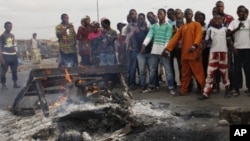A new Amnesty International report says war crimes have been committed on both sides of the political divide during Ivory Coast's violent post-election standoff.
A group from Amnesty International spent about two months in Ivory Coast, speaking to witnesses of a power struggle that erupted after last November’s disputed presidential election.
Amnesty International deputy director for Africa Véronique Aubert says forces loyal to former leader Laurent Gbagbo have carried out war crimes. That is also true, she says, of forces loyal to Alassane Ouattara, the incumbent president.
"We know that they have executed hundreds of men of all age on political and ethnic grounds," said Aubert. "We know that women have been raped. There are quite a lot of testimonies in the report, including on sexual violence."
Amnesty’s investigations focused on crimes carried out in and around Duékoué, a town about 500 kilometers from the capital, Abidjan.
She says the U.N. Operations in Ivory Coast, or UNOCI, failed to protect the population from the mass killings and rape that took place there in March.
"We all know that a lot of this happened when the United Nations operation was very close by, just a kilometer away from the killings in Duékoué," she said. "The UNOCI was not acting and was not protecting the population the way it had to."
And Aubert says the violence is continuing. The Amnesty report says in the first weeks of May attacks were carried out against villages inhabited by people believed to be sympathetic to Gbagbo.
Ouattara has promised to reconcile the two sides of the divide and has asked the International Criminal Court to probe allegations of serious crimes during the crisis.
But Aubert says Ouattara needs to do more by publicly condemning violence carried out by the force he set up in March, the Ivory Coast Republican Forces.
"It is his responsibility to exercise strict control over the armed forces and to call for an immediate end to the reprisals," she said. "He is the president and that is why we are asking him to publicly condemn those violations and control his forces.
The crisis in Ivory Coast was partially quelled last month when Gbagbo, who had refused to step down following the disputed election, was captured.
Amnesty: Ivory Coast’s Ouattara Giving 'Green Light' to Violence




